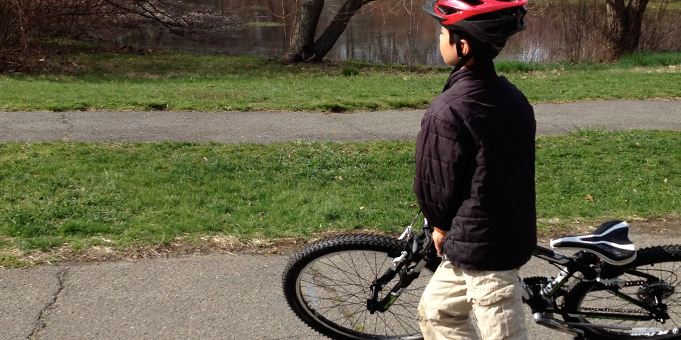This week, we’d like to share an article written by one of our former interns, Emmy Tolsdorf, about how we can create a bike-friendly city just like Copenhagen or Cambridge. We continue to make progress towards this very important goal. This past year, Newton approved $80k in American Rescue Plan Act (ARPA) funds to go towards the development of a Bike Master Plan, which is in the works. The Commonwealth Avenue Carriageway Redesign Project has been approved by the City Council and is proceeding to a final design. Last month, Green Newton donated bike helmets and lights to students at Newton North High School. In addition, we have Blue Bikes located all over the City and bike-share ridership is up 400% from last year. What kinds of things do you want to see in order to make Newton a more bike-friendly city?
Cambridge or Copenhagen?
Is Creating a Bike Haven in the United States Possible?
By Emmy Tolsdorf
Over the past several years, the number of bike lanes and cyclists across the U.S. has increased dramatically. Unfortunately, the number of cyclist fatalities has simultaneously increased. This is not a good statistic as states around the country are looking to increase ridership in order to get cars off the roads. Fewer cars on the road means less carbon emissions which is essential in the fight against climate change. So what can be done to make everyday commuters actually want to hop on a bike to get to work? To start, the safety of cyclists must be prioritized. I’ve seen how this can be achieved first hand.
In 2019, I spent a month in Copenhagen, Denmark taking a class called Bicycle Urbanism. I biked every day and felt safe even as cars whizzed by me. Most of the time, I was on a raised bike path that guided me by special traffic lights for bikers (pictured on right).
In my class, I learned numerous ways that Copenhagen transformed (during the 1980s/1990s) into the bike-friendly city it is today. Additionally, Amsterdam became a biking haven “only after a fierce activist campaign triggered by hundreds of traffic deaths” in the 1970s.
Many states and cities across the U.S. are on the right track to follow Copenhagen and Amsterdam’s lead for bike safety. Cambridge, Massachusetts is one of the most bikeable cities in the country. An ordinance in the city requires “the installation of safe bike paths on any road that the city is repairing.” In 2022, the League of American Bicyclists named Massachusetts the ‘Most Bike Friendly State,’ for making great strides in recent years by increasing funding for new and safe bike infrastructure, as well as increasing the public’s education level about biking. The state boasts bike lanes that are separated with posts from car lanes, while others are painted in bright green. In newer construction areas, such as the Seaport District in Boston (pictured above), bike lanes are raised off the level of the car lane and labeled with a picture of a bike. Additionally, in April of 2022, the state launched a new e-bike incentive program to further promote biking, walking, and transit as a way to reduce the state’s carbon emissions.
It will be challenging to convince many car users to switch to a bike at least some of the time, but the gas prices these days might be persuasive. Also, biking has the potential for a faster and healthier commute to work and/or school. We need the infrastructure to be there to support increased ridership. Without safe bike lanes, commuters will not be willing to risk their lives on a daily basis for the sake of reducing carbon emissions. Having car-free days in the summer in cities or creating appealing destinations that are only accessible by bike, are easy ways for our local governments to encourage biking across their regions. The takeaways from Copenhagen and Amsterdam are that it is very possible for our cities to make the necessary changes to become bike-friendly.
Sources:
Bike League Ranks Massachusetts As ‘Most Bicycle-Friendly State’. StreetsBlogMass. April 20, 2022.
Manjoo, Farhad. Riding a Bike in America Should Not Be This Dangerous. New York Times, April 21, 2022.
This article was written by Emmy Tolsdorf during her time as a Green Newton intern in the spring of 2022. She graduated from Boston College and is now working for Ceres as a Program Assistant in the Investor Network.



Recently on Twitter